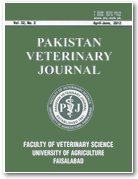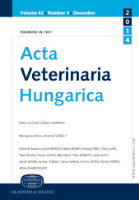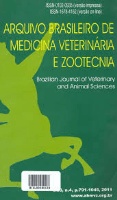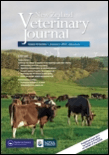
PAKISTAN VETERINARY JOURNAL
Scope & Guideline
Advancing veterinary science for a healthier future.
Introduction
Aims and Scopes
- Veterinary Microbiology and Infectious Diseases:
The journal publishes studies on the molecular characterization and epidemiology of infectious diseases affecting livestock and companion animals, emphasizing the importance of pathogen identification and control strategies. - Pharmacology and Toxicology:
Research on the efficacy and safety of pharmacological agents, including natural compounds, antibiotics, and their impacts on animal health, is a core focus area. This includes studies on toxicity, therapeutic effects, and protective mechanisms. - Animal Nutrition and Feed Science:
Papers exploring the nutritional needs of various animal species, the effects of dietary supplements, and the role of feed additives in promoting health and productivity are prevalent in the journal. - Animal Welfare and Management Practices:
The journal addresses issues related to animal welfare, including management practices that enhance the health and productivity of livestock and pets. - Veterinary Pathology and Diagnostics:
Research on histopathological findings, diagnostic methodologies, and the implications of diseases on animal health are significant components of the journal's offerings. - Zoonotic Diseases and Public Health:
The journal emphasizes the interconnection between animal health and human health, focusing on zoonotic diseases and their epidemiological implications. - Veterinary Education and Professional Development:
Papers discussing advancements in veterinary education, training methodologies, and comparative analyses of veterinary educational systems contribute to the journal's scope.
Trending and Emerging
- Nanotechnology in Veterinary Medicine:
There is a noticeable increase in studies exploring the applications of nanotechnology for drug delivery, disease treatment, and diagnostics, reflecting a trend towards innovative therapeutic approaches. - Antimicrobial Resistance (AMR) Research:
Research focusing on AMR is gaining prominence, driven by the urgent need to address the challenges posed by resistant pathogens in veterinary and public health. - Immunology and Vaccine Development:
The journal is seeing a rise in papers discussing novel vaccine strategies, including multi-epitope vaccines and immunotherapeutic approaches to combat infectious diseases. - Microbiome Studies:
Research on the role of microbiomes in animal health and disease is emerging as a significant area of interest, highlighting the importance of gut health in overall animal welfare. - Ethical and Welfare Considerations in Veterinary Practices:
An increasing focus on animal welfare and ethics in veterinary practices is evident, with studies addressing humane treatment, welfare assessments, and the impact of management practices on animal well-being. - One Health Approaches:
Research integrating human, animal, and environmental health perspectives is trending, emphasizing the interconnectedness of health issues across species and ecosystems.
Declining or Waning
- Traditional Veterinary Practices:
Research focusing on conventional veterinary practices and treatments is becoming less prevalent, as newer methodologies and evidence-based approaches gain traction. - Invasive Surgical Techniques:
Papers centered on invasive surgical methods are declining as there is a growing emphasis on minimally invasive techniques and alternative therapies that reduce animal suffering. - Local and Regional Disease Studies:
While regional studies remain important, the focus is shifting towards global perspectives and comparative studies that encompass a wider range of geographical contexts. - Single Species Studies:
Research concentrating solely on individual species is waning in favor of studies that adopt a One Health approach, integrating multiple species and their interactions with the environment.
Similar Journals

IRISH VETERINARY JOURNAL
Elevating veterinary knowledge to global audiences.IRISH VETERINARY JOURNAL is a premier open-access publication in the field of veterinary science, established to disseminate high-quality research and innovations that advance the veterinary profession and animal health. Published by BMC since 2004, this journal not only ensures worldwide access to cutting-edge findings but also maintains an impressive ranking as Q1 in the Veterinary (miscellaneous) category according to the 2023 metrics, highlighting its significance and influence. With an impressive Scopus rank of #19/194 and a 90th percentile placement, it provides a robust platform for researchers, professionals, and students alike to engage with the latest studies, reviews, and case reports. The journal's coverage spans from its inception in 1973 to the present, catering to a diverse audience interested in various aspects of veterinary science, ensuring that it remains an essential resource for those passionate about the welfare of animals and the advancement of veterinary practices.

ISRAEL JOURNAL OF VETERINARY MEDICINE
Exploring Innovations in Animal Health and ScienceThe Israel Journal of Veterinary Medicine, published by the Israel Veterinary Medical Association, serves as a vital resource for researchers, professionals, and students in the fields of veterinary medicine and animal science. With a commitment to advancing knowledge across diverse veterinary disciplines, this journal plays a crucial role in disseminating significant findings and innovations that influence both local and global veterinary practices. Although it currently holds a Q4 ranking in both the Animal Science and Zoology and Veterinary (miscellaneous) categories, the journal's open access policy, enabling free availability of articles, aspires to increase its accessibility and engagement among the academic community. The journal's convergence of research from 2007 to 2024 showcases its dedication to continuously contributing to the evolving landscape of veterinary science.

Revista de Investigaciones Veterinarias del Peru
Empowering Veterinary Professionals Through ResearchRevista de Investigaciones Veterinarias del Peru, published by UNIV NACIONAL MAYOR SAN MARCOS, stands as a pivotal resource within the field of veterinary sciences. With its ISSN 1682-3419 and E-ISSN 1609-9117, this journal aims to publish innovative research contributing to the advancement of veterinary practices and animal health. Since its inception in 1999, it has fostered an academic platform for professionals and researchers alike to share findings that are crucial for understanding and improving animal welfare in Peru and beyond. Although currently positioned in the Q3 category of Veterinary (miscellaneous) and ranked #163 out of 194 in the Scopus database, the journal's commitment to quality research and open access to veterinary knowledge continues to attract submissions and readership from a diverse audience. As it moves forward into 2024, the Revista de Investigaciones Veterinarias del Peru remains dedicated to disseminating critical insights that promote evidence-based practices in the veterinary field, stimulating further research and collaboration across continents.

Frontiers in Veterinary Science
Advancing veterinary practices for a healthier world.Frontiers in Veterinary Science is a premier open-access journal dedicated to the latest advancements and research in the field of veterinary science. Published by FRONTIERS MEDIA SA in Switzerland, the journal has been at the forefront of disseminating high-quality research since its establishment in 2014. With an impressive rank of #15 out of 194 in the general veterinary category and a high percentile of 92nd in Scopus rankings, it is recognized as a leading publication in veterinary medicine and related disciplines, maintaining a prominent Q1 quartile status as of 2023. The journal promotes the wide dissemination of knowledge through its open-access policy, ensuring that researchers, professionals, and students have unrestricted access to critical findings and innovations in veterinary science. Nestled in the vibrant academic landscape of Lausanne, Switzerland, Frontiers in Veterinary Science is not just a journal; it is a vital resource for advancing veterinary practices and improving animal health globally.

ACTA VETERINARIA HUNGARICA
Advancing veterinary science, one study at a time.ACTA VETERINARIA HUNGARICA is a prestigious academic journal published by AKADEMIAI KIADO ZRT, dedicated to the diverse field of veterinary science. With a history spanning over three decades since its inception in 1983, this journal provides a platform for the dissemination of high-quality research, clinical studies, and reviews that contribute to advancing knowledge in veterinary medicine and animal health. Based in Hungary, it has built a respectable reputation, reflected in its Scopus ranking, where it occupies the 84th position out of 194 in the General Veterinary category, placing it within the 56th percentile. Although the journal is not open access, it continues to attract a global audience of researchers, professionals, and students who are keen on exploring advancements in veterinary science as it converges towards its upcoming year of 2024. Readers will find valuable insights that foster innovation and improve animal care practices across various settings, making ACTA VETERINARIA HUNGARICA an essential resource for anyone involved in the veterinary field.

Iranian Journal of Veterinary Research
Bridging Science and Practice in Animal HealthWelcome to the Iranian Journal of Veterinary Research (IJVR), a prestigious platform dedicated to advancing the field of veterinary science. Published by Shiraz University, this journal plays a pivotal role in disseminating high-quality research findings amid a vibrant academic community. With its ISSN 1728-1997, and a convergence of studies from 2008 to 2024, IJVR serves as an essential resource for veterinarians, researchers, and students interested in Animal Science and Zoology. Recognized in the Q3 quartile for both Animal Science and Veterinary categories, it holds a respectable position with Scopus rankings placing it in the 54th percentile among general veterinary journals. Although it currently lacks an open access model, the journal ensures that cutting-edge veterinary research is presented with rigor and relevance, fostering knowledge that contributes to animal health and welfare. With its strategic focus on innovative methodologies, clinical practices, and the biological sciences, the IJVR is set to become your go-to source for critical advancements in veterinary research.

ARQUIVO BRASILEIRO DE MEDICINA VETERINARIA E ZOOTECNIA
Advancing veterinary science through open access.ARQUIVO BRASILEIRO DE MEDICINA VETERINARIA E ZOOTECNIA, an esteemed publication in the field of veterinary medicine and animal science, has been a vital resource for researchers and professionals since its inception in 1996. Published by the ARQUIVO BRASILEIRO MEDICINA VETERINARIA ZOOTECNIA, this journal is recognized for its open-access model, allowing widespread dissemination of knowledge since 1999. With a 2023 Scopus ranking placing it in the 25th percentile within the veterinary field, ARQUIVO BRASILEIRO is categorized in Q3 in Veterinary (miscellaneous), highlighting its commitment to scholarly excellence. The journal's scope encompasses a diverse range of topics related to veterinary medicine and zootechnics, making it a crucial platform for advancing research and professional practice. Situated in Belo Horizonte, Minas Gerais, Brazil, it serves not only the local community but also an international audience, fostering collaboration and innovation in veterinary sciences. As such, ARQUIVO BRASILEIRO is an invaluable asset for students, researchers, and practitioners looking to stay at the forefront of veterinary research.

CANADIAN JOURNAL OF VETERINARY RESEARCH-REVUE CANADIENNE DE RECHERCHE VETERINAIRE
Connecting Researchers, Elevating Animal HealthCanadian Journal of Veterinary Research - Revue Canadienne de Recherche Vétérinaire is a leading publication in the veterinary science community, published by the Canadian Veterinary Medical Association. Established in 1986, the journal serves as a crucial resource for researchers and practitioners alike, covering a broad spectrum of topics pertinent to veterinary medicine and animal health. With a current impact factor placing it in Q2 in the Veterinary (miscellaneous) category, it holds a rank of #85 out of 194 in Scopus for general veterinary research, demonstrating its influence and importance within the field. While the journal is not open access, it remains committed to the dissemination of high-quality research that fosters advancements in veterinary practice and education. Based in Ottawa, Canada, it strives to connect the international community of veterinary researchers and professionals through rigorous peer-reviewed articles that advance knowledge and methodologies in veterinary science.

Journal of Veterinary Research
Advancing veterinary science for a healthier tomorrow.The Journal of Veterinary Research, published by SCIENDO, is a leading open-access journal dedicated to advancing the field of veterinary science. Established in Poland and accessible globally since 2012, this journal serves as a pivotal platform for researchers, professionals, and students, promoting the dissemination of high-quality research and innovative findings in veterinary medicine. With a robust impact factor reflective of its Q2 ranking in the Veterinary (miscellaneous) category for 2023, it ranks 54th out of 194 in the general veterinary field, placing it in the 72nd percentile among its peers. The Journal of Veterinary Research explores a wide variety of topics pertinent to veterinary practice, animal health, and research methodologies, making it an essential resource for academics and practitioners alike. Authors benefit from the journal's open-access model, which ensures their research is freely available to a broader audience, thus fostering collaboration and innovation within the veterinary community.

NEW ZEALAND VETERINARY JOURNAL
Driving excellence in veterinary research and education.NEW ZEALAND VETERINARY JOURNAL, published by Taylor & Francis Ltd, stands as a pivotal platform in the realm of veterinary science, contributing significantly to the global discourse on animal health and welfare since its inception in 1952. With an ISSN of 0048-0169 and an E-ISSN of 1176-0710, this journal offers invaluable insights within both the veterinary and general medical fields, currently achieving a commendable Q2 ranking in Veterinary (miscellaneous) and Q3 in Medicine (miscellaneous) for 2023. Its Scopus ranking places it in the 76th percentile among veterinary journals, affirming its high-impact presence in academia. While access to this journal is not open, it maintains an essential role for researchers, professionals, and students aiming to advance their knowledge and contribute to the field of veterinary science. With a commitment to disseminating quality research, NEW ZEALAND VETERINARY JOURNAL enriches the understanding of veterinary practices and enhances ongoing dialogue on critical health issues affecting animals, promoting better outcomes through scientific inquiry.